In the past two weeks, Hong Kong publisher Raymond Yeung has hastily made changes to a draft paper copy of a book entitled To Freedom (致自由), replacing the word “revolution” with “protests,” tweaking a banned slogan and cutting passages that advocate independence for the Chinese territory.
The changes were hard to make, he said, but impossible to avoid since China passed a National Security Law on June 30, making the broadly defined crimes of secession, subversion, terrorism and collusion with foreign forces punishable by up to life in prison.
“This is really painful,” Yeung said, as he flipped through pages of the collection of essays by 50 protesters, lawyers, social workers and other participants in the pro-democracy demonstrations that shook Hong Kong last year.
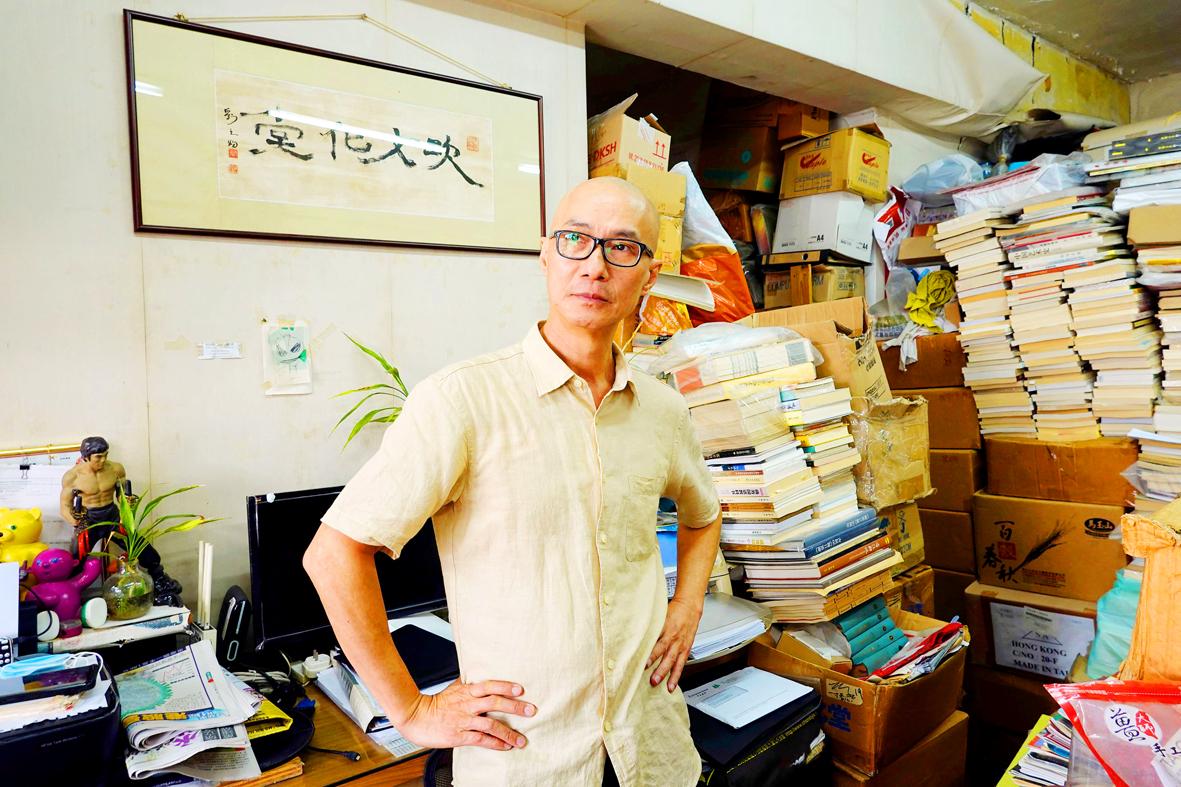
Photo: Reuters
“This is history. This is the truth,” he said, holding up the book with blue sticky flags on many pages to mark changes made because of the new law.
Just as demand for political books was surging in Hong Kong after a year of protests, the territory’s once unbridled and prolific independent publishers are now censoring themselves in the face of the new law.
Hong Kong authorities say freedom of speech remains intact, but in the past two weeks public libraries have taken some books off the shelves, shops have removed protest-related decorations and the slogan “Liberate Hong Kong! Revolution of our times” has been declared illegal.
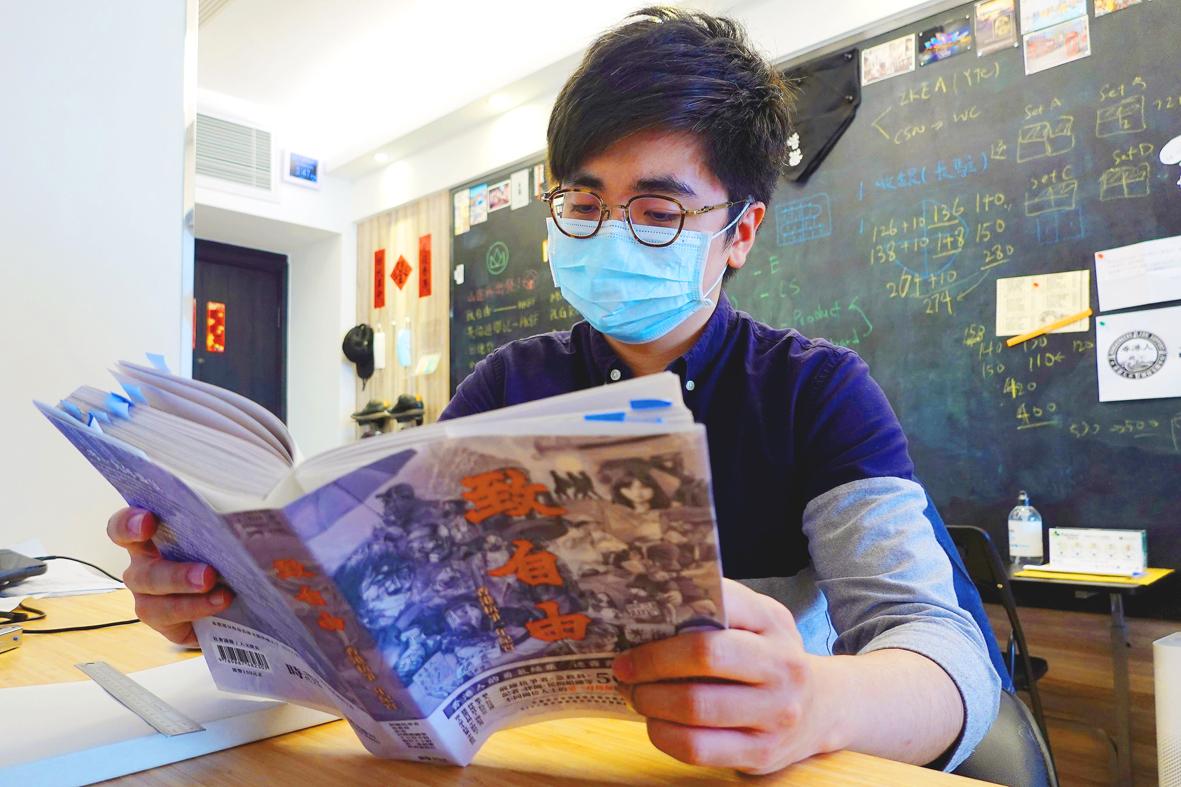
Photo: Reuters
To Freedom is the first political book Yeung has taken on as a part-time publisher.
After Beijing introduced the security law, the book’s original printer bailed, and two other printers declined, he said.
Another printer agreed to take it anonymously, but wants to get a better sense of how the law is implemented first.
The Hong Kong Trade Development Council, which organizes the annual Hong Kong Book Fair, told exhibitors not to display what it called “unlawful books” at this week’s planned fair.
The council postponed the fair at the last minute on Monday due to a recent spike in COVID-19 cases. It did not specify a new date for the event.
Three non-governmental pro-Beijing groups had teamed up to urge people to report stalls at the fair selling material promoting Hong Kong independence, a subject that is anathema to the Chinese government.
“Every citizen has a duty to report crime,” said Innes Tang (鄧德成), chairman of PolitiHK Social Strategic, one group behind the campaign. “We are not the police. We are not the ones to say where the red line is.”
Jimmy Pang (彭志銘), a veteran local publisher who has participated in every fair since it began in 1990, called this year “the most terrifying year” because of the security law and the economic downturn that was already hurting publishers.
He said the law has prompted publishing houses and writers to halt projects while printers, distributors and bookstores have turned down sensitive books.
For example, Breakazine, a local Christian publication, said it suspended the distribution of its mid-July issue called “Dangerous Reading” while seeking legal advice for navigating the security law.
“Everyone is avoiding risks by suffering in silence,” said Pang, a spokesman for 50 exhibitors at the fair.
Last year, a unit of Pang’s Sub-Culture Ltd published Chan Yun-chi’s (陳潤芝) 6430 (六四記憶) — a book of interviews with surviving pro-democracy protesters in the run-up to the 30th anniversary of the 1989 Tiananmen Square Massacre, a subject heavily censored on the mainland.
“In the future, there will be no sensitive books related to politics,” he said.
Bao Pu (鮑樸), the son of Bao Tong (鮑彤), the most senior Chinese Communist Party official jailed for sympathizing with Tiananmen protesters, founded New Century Press in 2005 in Hong Kong to publish books based on memoirs and government documents and other sources that often differ from the official versions of events in China and could not be published on the mainland.
His customers were mostly mainland visitors, a lucrative niche in Hong Kong until China began to tighten border controls a decade ago, making it harder to bring back books to the mainland.
Given the drop off in demand, Bao Pu said he no longer plans to publish such books in Hong Kong. However, he urged other publishers to avoid self-censorship.
“If everybody does that, then the law would have much more impact on freedom of speech,” he said.

FEROCIOUS FISH-EATER Scientists have found a new species of dinosaur from the Cretaceous Period, a ‘hell heron’ that stalked the rivers, deep in the Saharan desert At a remote Sahara desert site in Niger, scientists have unearthed fossils of a new species of Spinosaurus, among the biggest of the meat-eating dinosaurs, notable for its large blade-shaped head crest and jaws bearing interlocking teeth for snaring fish. It prowled a forested inland environment and strode into rivers to catch sizable fish like a modern-day wading bird — a “hell heron,” as one of the researchers put it, considering it was about 12 meters long and weighed 5-7 tons. The dinosaur presented a striking profile on the Cretaceous Period landscape of Africa some 95 million years ago as it hunted
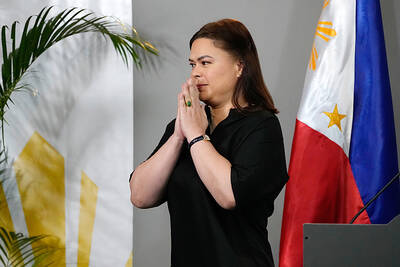
‘COST OF DEFECTION’: Duterte’s announcement could be an effort to keep allies in line with the promise of a return to power amid political uncertainty, an analyst said Philippine Vice President Sara Duterte yesterday announced she would run for president of the Southeast Asian nation of 116 million in 2028. Duterte, who is embroiled in a bitter feud with Philippine President Ferdinand Marcos Jr, was impeached last year only to see the country’s Supreme Court throw the case out over procedural issues. Her announcement comes just days before her father, former Philippine president Rodrigo Duterte, begins a pretrial hearing at the International Criminal Court (ICC) in the Netherlands over crimes against humanity allegedly committed as part of a brutal crackdown on drugs. “I offer my life, my strength and my future
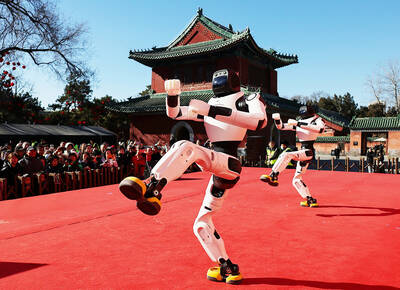
NOT YET THERE: While the show was impressive, it failed to demonstrate their ability to move in unstructured environments, such as a factory floor, an expert said Dancing humanoid robots on Monday took center stage during the annual China Media Group’s Spring Festival Gala, China’s most-watched official television broadcast. They lunged and backflipped (landing on their knees), they spun around and jumped. Not one fell over. The display was impressive, but if robots can now dance and perform martial arts, what else can they do? Experts have mixed opinions, with some saying the robots had limitations and that the display should be viewed through a lens of state propaganda. Developed by several Chinese robotics firms, the robots performed a range of intricate stunts, including martial arts, comedy sketches and choreographed
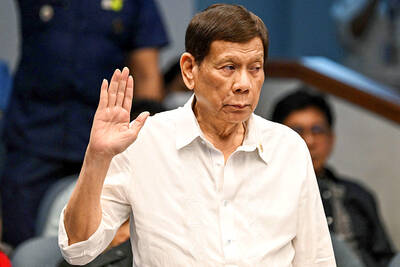
DRUG WAR: The former president said there was no campaign to kill addicts, but his speeches called for violence and told police to use lethal force if necessary Former Philippine president Rodrigo Duterte earned global infamy for the deadly drug crackdown that led to his arrest over crimes against humanity charges, despite his huge popularity at home. A profane-lipped populist and self-professed killer, Duterte’s anti-crime campaign resulted in the deaths of thousands of alleged dealers and addicts. Rights groups said many of those killed were poor men, often without any proof they were linked to drugs. Yet, while drawing condemnation abroad, tens of millions of Filipinos backed his swift brand of justice — even as he joked about rape in his rambling speeches, locked up his critics and failed to